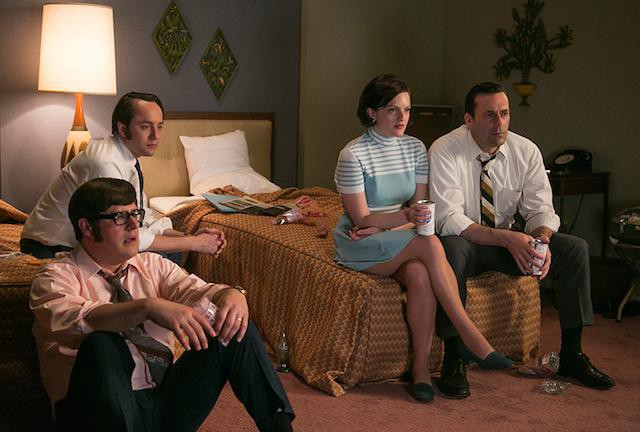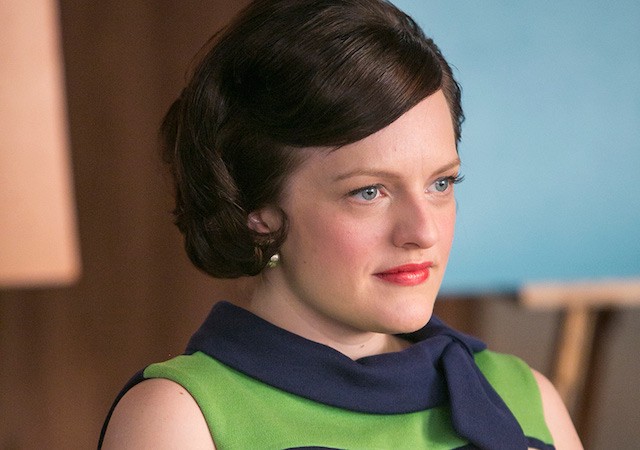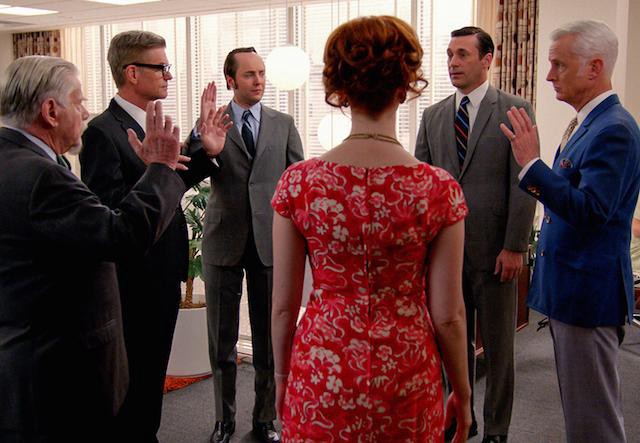Mad Men Season Finale: “The Best Things in Life Are Free”
by Jen Doll

Caution: spoilers.
Sunday night’s Mad Men marked the last episode before we start back up again in 2015–2015! — with the final seven episodes of the last season. It was called “Waterloo” and yes, there were Napoleon references. But more than Napoleonic wars, the threads I saw in this episode were the same we’ve been noticing all season: In the show (and in life) there are those who work for money, and those who work for love. Figuring out which one of those types you are, and aligning yourself with the right team, is important. Alliances bring us back to Napoleon a bit, and there are most definitely some cleared-up, redefined alliances in this episode. As for the historical backdrop of the show, it was nothing Manson, but instead, the takeoff of the space shuttle Apollo 11 and its landing on the moon. This moment crossed generations, races, social and class constructs — everyone was watching, and when everyone is doing something, it’s a good way to witness differences in their reactions and emotions.
The show starts with Bert Cooper watching the takeoff, smiling. We cut quickly to a juxtaposition: Ted flying his tiny plane with two Sunkist clients in it, talking about the astronauts. “Maybe they won’t make it, all their problems will be over,” says Ted, in what is clearly an unpopular view. Ted, whom we haven’t seen much of all season, has seemed to waste away creatively in L.A. He is no longer working for love (of either the job or of Peggy; he’s lost). So when he turns off the plane mid-air, freaking out his clients enormously, it seems he’s considering ending it all as a solution to the problem that is a life of ennui, with nothing in it that’s very special at all. When next we see him he’s being lectured by Jim Cutler about his actions, with Pete listening in, Mean-Girls like. Pete’s alliance to Don has grown stronger and stronger this season; at this point, he’d jettison Ted and get back to New York if he could. A key bit of dialogue between Ted and Jim: Ted says, “I don’t want to die, I just don’t want to do this anymore.” Cutler retorts, “I don’t think that’s possible.”
Next on Jim Cutler’s list of headaches is Lou Avery, who comes in complaining that Commander cigarettes is dead, and that, for his 10 years of work building a tobacco resume, he’s “going to crawl out of this place with nothing left to show.” Jim, who is a bit of a Napoleonic (or Machiavellian?) type, puts him in his place, telling him he’s just a hired hand. No one is going to cry over the loss of Lou.
At Betty’s house, there are visitors. Carolyn, Betty’s old college roommate, has come to stay with her husband and two sons, who Betty refers to as “fully-grown men.” One of them catches Sally’s eye, or maybe it’s vice versa, but there are some sparks between Sally and the older brother, Sean. Meanwhile, Neil, the younger, nerdy one with a telescope, is paired off as friends with Bobby.
At the agency, the always a bit insecure Harry is complaining that his wife has stopped talking divorce due to his impending partnership. Don tells him, “Don’t negotiate, just accept the deal” which, for the record, is exactly what Don did earlier this season with Sterling Cooper. The team is going over their Burger Chef presentation in a casual way, and when Peggy gets to her part, she does the same, but Pete questions her (and no one else — remember his comment last episode that she’s as good as any other woman out there? She, out of the rest of them, is required to prove something). She gives him the full speech, then, and it’s better than anything else. “Every great ad is a story,” she says in her introduction of Don. Pete’s then done, he doesn’t need to see Don present, he just has to hope things go OK on the moon. (Of course, this bit of suspense for them doesn’t really play out for the viewers at home, as we have the spoiler benefits of history.)
Things are looking up for Peggy. She gets home and there’s a handsome contractor working there, not her usual guy, but someone named Nick who says, charmingly, “You’ve got a lot of books,” and then gives her his number, in case she’s in need of “odd jobs.” Julio, the neighbor kid, is in the background lurking, and Nick presumes the 10-year-old is Peggy’s son, but she clears him up on that and also makes sure to mention she owns the building. Unlike her ex, Abe, he is impressed, and Peggy smiles looking at his number. Julio asks for a popsicle — it’s a callback perhaps to the Popsicle pitch in Season 2 (break it in half and share! Peggy is sharing with a kid who is, well, one of her only friends this season) and/or to the scene in which Don takes his kids to see the house where he grew up, and a lonely boy is sitting on the porch with a popsicle.

Carolyn and Betty chat and smoke, talking about their kids and also about Don, does Betty ever see him? “I’m starting to think of him as an old, bad boyfriend, someone a teenage anthropologist would marry,” says Betty. (God, Betty can put forth some wisdom now and again. Did you know she also speaks Italian?) Sean and Sally bump into one another, and there is a spate of awkward sparks again before Sally heads off to her lifeguard job at the local pool (wearing lipstick, which Betty notes).
In the office, Don’s secretary is stricken. He and she go in his office, she pats the couch and passes him a letter. He’s gotten notification of breach of contract (that stuff he agreed to without negotiation) for barging into the Commander meeting, and he’s going to be fired. He’s shocked and pissed; she sees it as a moment to make her move. “I know you’re feeling vulnerable, but I am your strength,” she says, kissing him, and Don looks half-amused, half livid. “We can’t do this,” he tells her, instructing her to call his lawyer. Fully livid, he then goes into Cutler’s office, shouting, and Cutler throws back a round of hurtful comments, including how Don’s most eloquent moment has been talking about his childhood in the disastrous meeting that set into motion all that came next. Don turns to Roger, his ally, and Joan and Bert Cooper, his presumed allies, and asks if they knew. Joan, sick of his antics, focused on her own well-being (and, primarily, making money), votes that Don should leave. Cooper and Roger stand behind Don, and Pete is pissed that his “sensitive piece of horseflesh” is being rattled. “I’m tired of him costing me money,” says Joan of Don, but she also tells Jim, “you shouldn’t have done that.” Either way, she’s being cost money. There is no amount of money to make up for what she’s already been cost.
Peggy’s packing to go to Indianapolis for the Burger Chef presentation, and in comes Julio, who wants to watch TV. She tries to get him to help pick her outfit, one option of which “is a suit and it has grey, which men wear,” but he looks at her blankly. He wants to watch TV on Sunday, when the astronauts are supposed to land, and Peggy, not always so great with the kiddos, tells him they may not make it. He’s crestfallen, but not only because of that. He confesses that he has to move to Newark, his uncle has gotten his mom a job, and he hugs Peggy, who wipes away her own tears. Julio is her friend, but he’s also representative of the child she had but didn’t.
Don, too, is packing, though he’s not even sure he’s going to Indianapolis after the arrival of the letter. He calls Megan, who’s on her deck wearing a bikini, her own telescope in the background, wine within reach, reading a script. The conversation begins casually — she’s later going to see The Wild Bunch with a friend — and then Don tells her about work. “They want me to move on,” he says. “Well, maybe you should,” Megan responds. “Aren’t you tired of fighting?” This is a conversation with a relationship subtext. “I guess I could see it as an opportunity,” he says, telling her he could move out to California. But Megan is over it. It’s not going to work. And in a few moments of silence it becomes clear, this is finally, actually, probably, most likely done. Even though Megan appears to be cutting it off with him, Don plays the paternal role; perhaps he knows it’s his fault, he’s not going to fight for her. “I’ll always take care of you,” he says. “I’ll be fine,” she says. “You don’t owe me anything.”
Back at the office, Roger consults Bert Cooper, who offers some Yoda-like business wisdom about how “No man has ever come back from leave, not even Napoleon,” but as a leader, Bert will be loyal to his team, and on that team is Don. Roger’s not a leader, he says. Cutler is, but he’s not on Bert’s team. Alliances are important.
In the plane to Indianapolis, Peggy and Harry sit together, Pete and Don up ahead a few seats, Pete giving Don a pep talk about winning the account and also about coming to California to replace Ted, who’s gone “off the deep end,” he explains, invoking Lane Price. Don, without a word, makes it clear things with Megan are over, California has lost appeal. ” “Marriage is a racket!” says Pete, shaking his head.
Everyone gathers around their respective televisions to watch man land on the moon: The families at the Francis household, Peggy and Don and Pete and Harry in their hotel room (Peggy brings Don and herself a beer; alliances in full view), Roger and his makeshift family of Ellery and Margaret’s husband and his ex-wife, Bert Cooper and his housekeeper. Cooper is thrilled; the younger generation, represented by Sean, is less so: “It costs 25 billion,” he says. “‘Cause there are no problems back on earth?” Don calls and Sally answers, echoing the boy’s cynicism. Don asks if she’s want her little brothers to think like that. “No,” she says, and later, outside, runs into Neil, who’s looking through his telescope. After he shows her how to use it, she spontaneously kisses him — ushering him into adulthood, maybe, or choosing the less cynical younger brother, the one who says there are things to look at beyond TV? He’s called inside and she smokes a cigarette and stares at the sky, where things are unknown.
Another phone rings, at Roger’s house, and the next thing we see is him in the agency, taking Bert’s name tag off his door. Joan arrives, crying, as does Cutler, so sensitive he brings up Don’s departure in the first few sentences.
Roger calls Don, in his Indianapolis hotel room, to tell him the news about Bert, and what that means for Don’s job — they no longer have the votes. Bert, of course, was Roger’s father figure, and Roger is recounting the last things he said, how she should have known: “Every time an old man starts talking about Napoleon you know he’s gonna die.” “You know Bert was proud of you,” Don tells him. The news spurs Don to action. He tells Peggy she needs to give the Burger Chef presentation, because, quite reasonably, if he wins it and then is forced to leave, she’ll be left with nothing. But if she wins it, it’s hers. Peggy shakes her head: “I’m unprepared. I can’t just say what you’ve been saying, I’m a woman, I’m the voice of moms.” “Maybe that’s how it should be,” says Don, and his relationship to Peggy, maybe, is like Bert’s was to Roger; he’s something of her de facto Dad (remember last episode, their father-daughter reminiscent dance?) and he wants to give her a chance, to set her up for success, too. He may not owe anything to Megan, but he owes Peggy.

Roger, meanwhile, is being a leader and a visionary, despite what Bert told him last. He has a meeting with McCann, pitching a sale of Sterling Cooper to the bigger agency to become an independent subsidiary, so they get to keep Don, and do what they want. The deal, though, is that Ted will have to come, too.
Peggy sits wearing a dress instead of the man-suit she showed Julio. Things cut to slow motion, the way earlier in the season we saw Megan get out of her car to meet Don at the airport. This time, Peggy looks at Don, Don looks back at Peggy, and Don’s introducing Peggy the way she would have introduced him. “Every great ad tells a story, here to tell that story is Peggy Olson.” “That’s a lot to live up to,” Peggy begins, and launches into her story, about how all were bonded by watching man land on the moon, how humans are starved for that kind of connection, and how Burger Chef is a place where they can get it. (She gives a shout-out to Julio in this speech, presenting the 10-year-old boy as if he were her son, as it would certainly be assumed by those who don’t know any differently.) “What if there was another table, where everybody gets what they want, when they want it?” she says. “There may be chaos at home, but there’s family supper at Burger Chef. ” The clients love it.
When Don gets home, Roger’s there waiting for him, explaining the offer from McCann. Don is unsure. “Did you forget we started this agency to get away from them?” he asks. “A lot’s happened in between,” says Roger. His trump card is that Don wants to do the work, it’s all for the love of the work; what else would Don do, if not for the work? The next day, in a meeting in Roger’s office, the partners are gathered, including Ted. There’s some Cutler-Sterling jousting for control — Cutler wants them to finalize Don’s departure after reading “O Captain! My Captain!” for Cooper — but Sterling wins with his important announcement. If they sign five-year contracts and sell to McCann, they’ll be millionaires, except for poor Harry, who hasn’t signed yet. Ted is ultimately convinced by Don because of, of course, the work. “I know you,” Don says. “You don’t have to work for us, but you have to work. You don’t want to see what happens when it’s really gone.” Ted, given the promise of moving back to New York, agrees, and then Cutler — himself a hired hand — agrees too, because it’s a lot of money.
Burger Chef has been won, Don and Peggy hug, and Don heads downstairs to get “back to work.” And as Roger makes the announcement of Cooper’s death, there’s a song-and-dance number in Don’s imagination? In reality? In some alternate universe? Don watches Bert dance toward him in his argyle socks, flanked by a group of singing, dancing secretaries. “Don my boy, the stars in the sky, the moon on high. They’re great for you and me, because they’re free,” he croons. “The moon belongs to everyone. The best things in life are free. Love can come to everyone. The best things in life are free.” And then Bert dances off with the into an office, and the door closes. Don looks glassy-eyed, close to tears, and sits on a desk to brace himself. Now, I’m not entirely sure what to make of this scene, but Don has just become a very rich man, and yet, it seems clear that he knows there are certain things that are far more important than money. What he will do with that knowledge remains to be seen in 2015.
Previously: “It’s Nice to See Family Happiness Again”
Jen Doll is a regular contributor to The Hairpin and author of Save the Date.